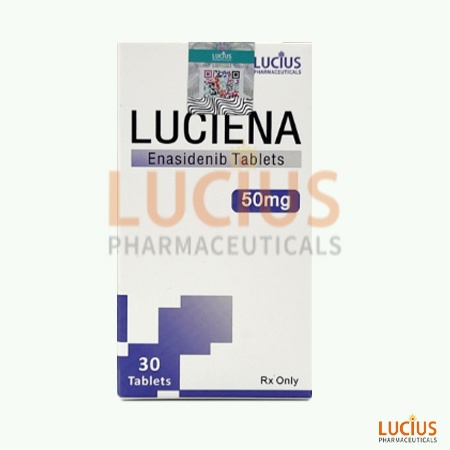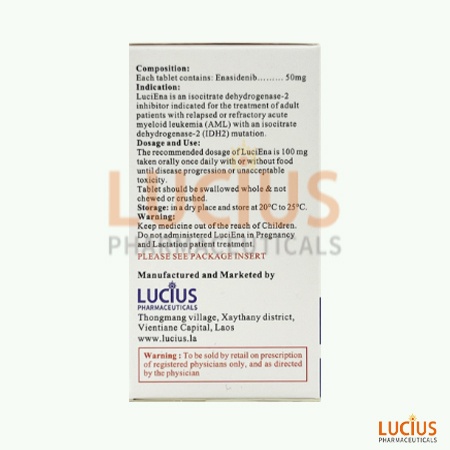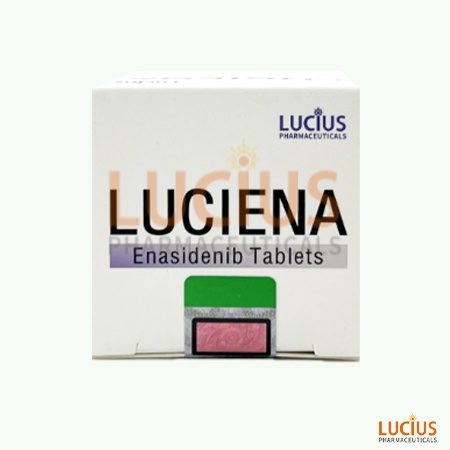





Another NameIDHIFA、恩西地平、ENASIDX
IndicationsEnasidenib is suitable for Leukemia.
Reg No.09 L 1019/23
Inspection NO.


Enasidenib is an isocitrate dehydrogenase 2 (IDH2) inhibitor. The TCA cycle is essential for many biochemical signaling pathways, and IDH2 is a key enzyme in the tricarboxylic acid cycle, and certain mutant forms of this protein (R140Q, R172S, R172K) lead to an increase in the specific metabolite 2-hydroxyglutarate (2-HG), and encidipine can reduce the content of 2-HG to induce leukemia cell differentiation.
Enasidenib is a drug for specific types of leukemia, and it is a new type of treatment that has significant efficacy in some leukemia patients.
Enasidenib produced by Lucius Pharmaceuticals is a generic version of the original drug, which is consistent with the original drug in terms of composition, efficacy and safety.
Encidipine mesylate
Select patients for the treatment of AML with Enasidenib based on the presence of IDH2 mutations in the blood or bone marrow.
Based on animal embryo-fetal toxicity studies, Enasidenib can cause fetal harm when administered to a pregnant woman. There are no available data on Enasidenib use in pregnant women to inform a drug-associated risk of major birth defects and miscarriage. In animal embryo-fetal toxicity studies, oral administration of enasidenib to pregnant rats and rabbits during organogenesis was associated with embryo-fetal mortality and alterations to growth starting at 0.1 times the steady state clinical exposure based on the AUC at the recommended human dose. Advise pregnant women of the potential risk to a fetus.
There are no data on the presence of enasidenib or its metabolites in human milk, the effects on the breastfed child, or the effects on milk production. Because of the potential for adverse reactions in the breastfed child, advise women not to breastfeed during treatment with Enasidenib and for 2 months after the last dose.
Advise females of reproductive potential to use effective contraception during treatment with Enasidenib and for 2 months after the last dose. Coadministration of Enasidenib may decrease the concentrations of combined hormonal contraceptives. Advise patients using hormonal contraceptives to use an effective non-hormonal contraceptive method during treatment with Enasidenib and for 2 months after the last dose.
Advise males with female partners of reproductive potential to use effective contraception during treatment with Enasidenib and for 2 months after the last dose of Enasidenib.
Safety and effectiveness of Enasidenib in pediatric patients have not been established.
No dosage adjustment is required for Enasidenib based on age. In the clinical study, 61% of 214 patients were aged 65 years or older, while 24% were older than 75 years. No overall differences in effectiveness or safety were observed between patients aged 65 years or older and younger patients.
Store at 20°C-25°C (68°F-77°F); excursions permitted between 15°C-30°C (59°F-86°F). Keep the bottle tightly closed. Store and dispense in the original bottle (with a desiccant canister) to protect from moisture.
The absolute bioavailability after 100 mg oral dose of enasidenib is approximately 57%. After a single oral dose, the median time to Cmax (Tmax) is 4 hours.
FDA,2023.12